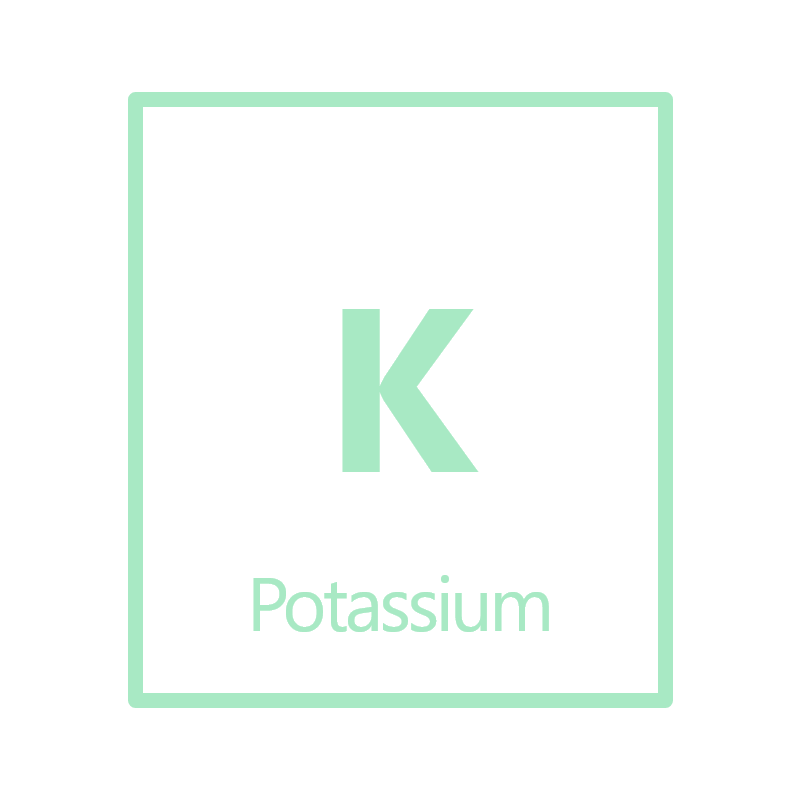
For most crops, Potassium (K) is required in large quantities, as it is a macroelement. It is an essential nutrient for many physiological plant processes, such as regulating the cellular osmotic potential and activating enzymes involved in photosynthesis, transpiration and respiration. Nutrition with sufficient potassium ensures resistance to abiotic and biotic stresses. In addition, potassium affects the physiological, qualitative and organoleptic characteristics of the fruit, which is why it is commonly known as a “quality nutrient”. Cotton, wheat, potatoes, soybeans and apple trees are considered crops that are highly sensitive to potassium deficiency.
1. Basic functions of potassium
- The role of potassium in plants is multi-faceted:
- Enzyme activation. More than sixty (60) enzymes involved in numerous physiological processes are fully dependent on or activated by the presence of potassium.
- Activity of the stomata. Proper stoma function is essential for processes, such as photosynthesis and nutrient transport. As the content in potassium ions (K+) increases, their osmotic potential increases, water enters from the adjacent cells and, thus, the stoma opens. Exactly the opposite phenomenon occurs when there is an outflow of potassium ions (K+) from the guard cells. In case of potassium deficiency, the stomata respond more slowly to existing changes, so plants become more susceptible to water stress.
- Photosynthesis. The role of potassium in photosynthesis is complex. One product of photosynthesis, which is used as an energy source, is adenosine triphosphate (ATP). Potassium activates enzymes that are involved in the production of adenosine triphosphate (ATP). Thus, when plants are in a state of potassium deficiency, the rate of ATP production decreases and all ATP-dependent processes decelerate. Research also shows that high concentrations of K+ in the leaves are directly linked to greater CO2 uptake.
- Transportation of sugars. The transportation of sugars through the cortex is a physiological process that depends on ATP production. If potassium is insufficient, the transportation system is slowed down.
- Transportation of water and nutrients. A sufficient concentration of potassium in a plant is directly linked to the effectiveness of nitrates, phosphates, calcium, magnesium and amino acid transportation systems.
- Protein synthesis. Potassium is required in each stage of protein synthesis.
- Starch synthesis. Potassium activates the starch synthase enzyme, which is responsible for starch synthesis.
Quality characteristics of the fruit. Potassium affects the physiological, qualitative and organoleptic characteristics of the fruit. In addition, it ensures resistance to any kind of abiotic stress. Potassium sufficiency is important throughout the growing season. Because even short periods of potassium deficiency, especially during critical growth phases, can cause serious losses in both yield and quality.
2. Availability
Potassium is taken up by the plant as a K+ potassium ion and remains in this form in all the physiological processes involved.
The forms in which potassium is found in the soil are the following:
- Bound form in primary soil minerals – (non available form).
- Bound form in clay minerals – (slowly-available form).
- Immediately available K+ form from the soil solution.Bound form in soil organic matter.
- Bound form in soil organic matter.
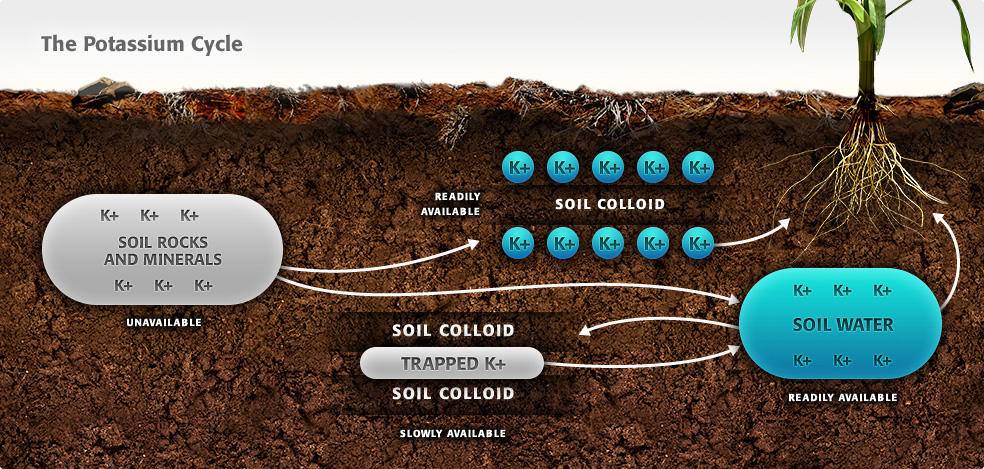
Potassium interacts with other elements in relation to its availability. Potassium has been found to be negatively correlated to magnesium (Mg), manganese (Mn), calcium (Ca) and boron. In contrast, Sulphur (S), zinc (Zn) and phosphorus (P) show a positive correlation with potassium.
3. Potassium deficiency
Potassium is a mobile element within the plant, therefore the symptoms of its deficiency first occur in older leaves. Common symptoms of potassium (K) deficiency are:
- Chlorosis of the leaf perimeter.
- Defoliation (mainly in broadleaf plants).
- Slow root growth.
- Leaf discolouration.
- Reduction of resistance to biotic and abiotic stress.
- Degradation of the organoleptic characteristics (reduction of fruit sugar content).
- Reduction of resistance to abiotic and biotic stress.
Potassium deficiency is highly observed in cotton, wheat, potatoes, soybeans, and apple trees. Here are some examples on specific crops.


4. Tips for preventing potassium deficiency
Firstly, we suggest that you conduct a soil analysis of your field every two years, so that you have a complete picture of the nutrient levels. Compare your yield goals with the availability of your nutrients and discuss the available options with your agronomist. It is important to apply the right amount of potassium, at the right rate, always using the right product, as there is a fine line between nutrient deficiency and toxicity.
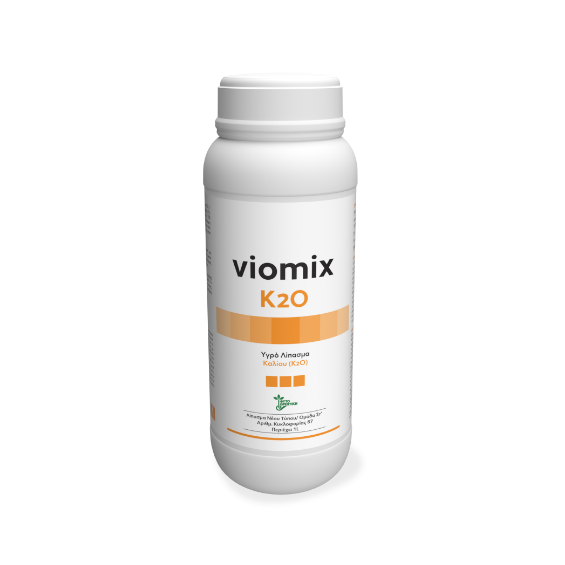
VIOMIX POTASSIUM is an ideal liquid fertiliser for a wide range of crops, as it contributes to achieving a balanced nutrition. It contains high concentrations of potassium in the form of a 30% potassium complex (K2O) with amino acids and 10% oligopeptides. More information about the product’s user guide can be found in the “Products” tab on our website.
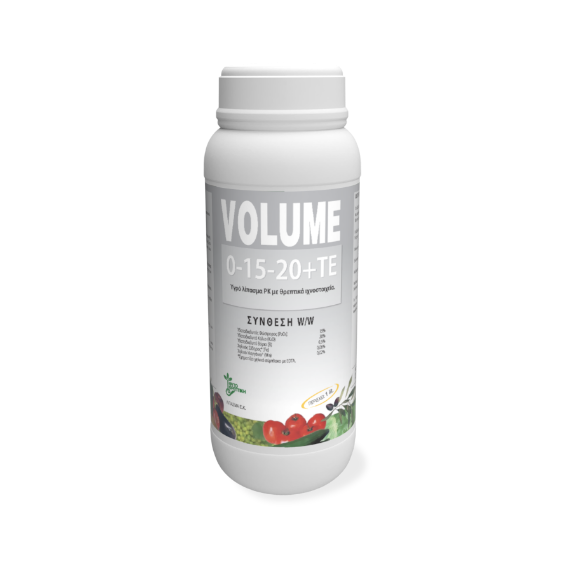
VOLUME is a specialised potassium pyrophosphate nutrition product. It contains 20% phosphorus (P2O5), 26% potassium (K2O), 6.5% L–amino acids, 0.65% boron (B), 0.00195% copper (Cu) EDTA, 0.078% iron (Fe) EDTA, 0.0026% manganese (Mn) EDTA, 0.0026% zinc (Zn) EDTA. The pH of the preparation is 9.7. More information about the product’s user guide can be found in the “Products“ tab on our website.
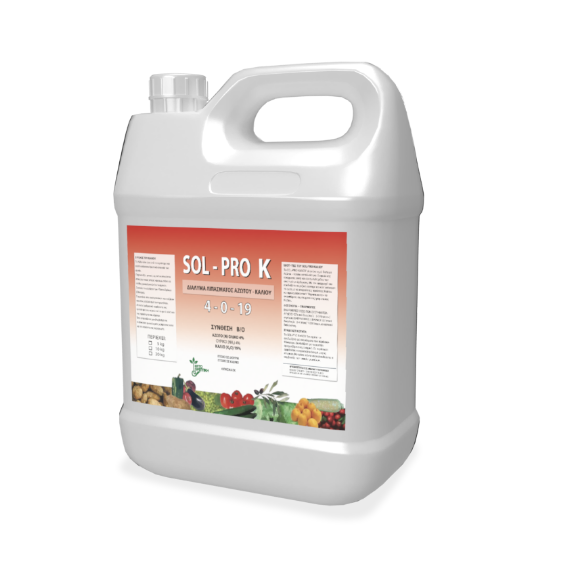
SOL – PRO K is a liquid complex of nitrogen, potassium and an organic agent of plant origin. It contains nitrogen (N) 4%, potassium (K2O), organic matter 15%, fulvic acids 6.5% and polysaccharides 11 – 13%. The pH of the preparation is 7.5. More information about the product’s user guide can be found in the “Products“ tab on our website.
